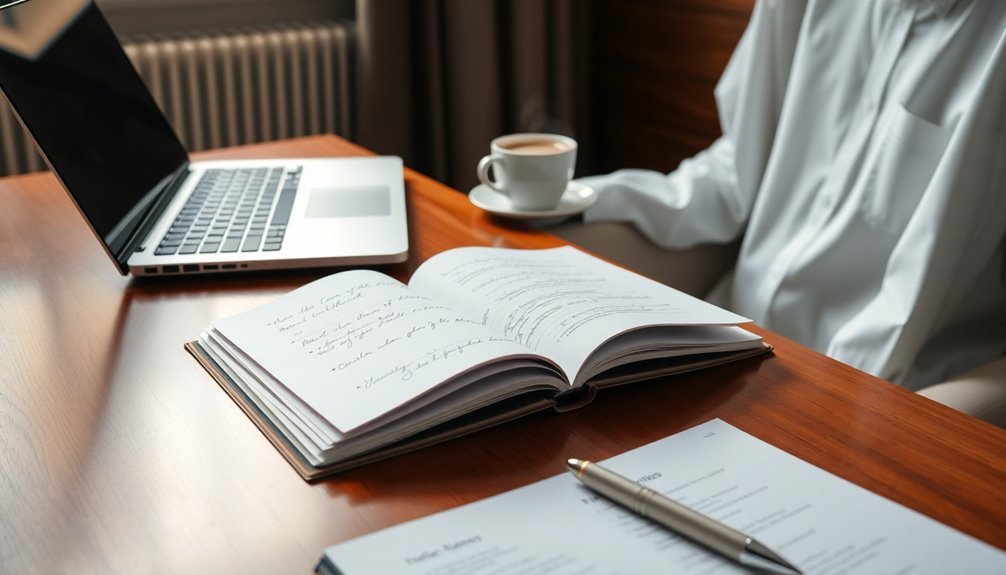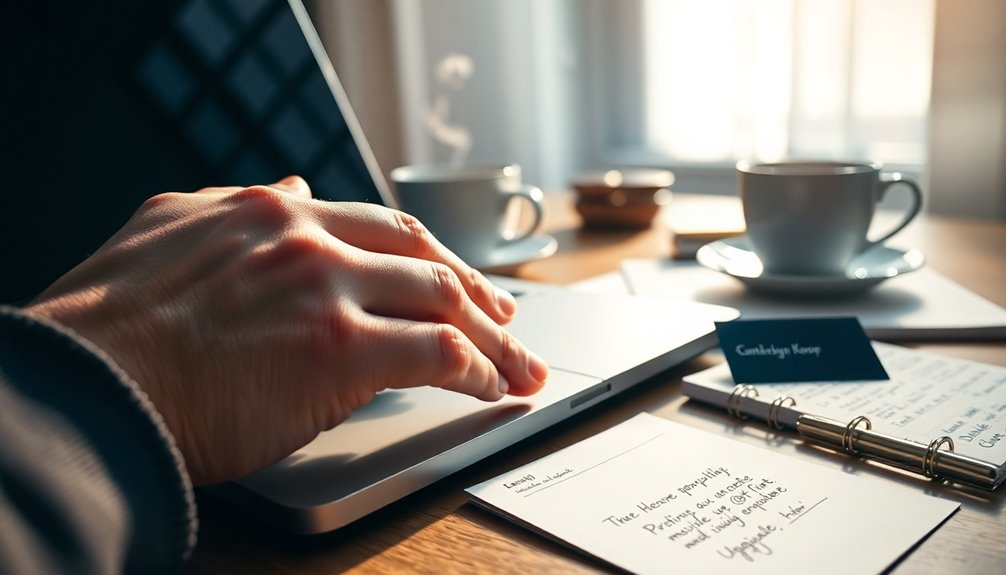Mastering basic interview questions is essential for your success. These questions assess your self-awareness and cultural fit, often shaping the employer's first impression within the first 90 seconds. When you prepare by researching the company's values and practicing your responses, you'll feel less anxious and more confident. Use the STAR method to structure your answers, linking your experiences to the job requirements. Engaging with interviewers creates a positive rapport that can tip the scales in your favor. Want to enhance your interview skills further? There's more you can uncover to stand out and make a lasting impact.
Key Takeaways
- First impressions matter; strong responses to basic questions can shape the interviewer's perception within the first 90 seconds.
- Prepare by researching the company culture and values to tailor your answers effectively and demonstrate alignment.
- Use the STAR method to articulate your experiences clearly, emphasizing relevant skills and outcomes related to the job.
- Practice answering common questions to enhance confidence and clarity, reducing anxiety during the interview.
- Engage actively with interviewers by asking insightful questions, showcasing your genuine interest in the role and company.
Understanding Basic Questions

Understanding basic interview questions is essential for any candidate looking to make a strong impression. These questions, like "Tell me about yourself," help employers assess your self-awareness and cultural fit within their organization. They often seek to uncover your strengths, weaknesses, motivations, and career goals, offering valuable insights into how well you might fit the role.
Employers utilize these interview questions to evaluate your communication skills and decision-making abilities under pressure. You might not realize it, but your personality traits often shine through in your responses, even if they're not evident on your resume. Preparing thoughtful answers can greatly impact first impressions, as research shows that 33% of employers form their opinions within the first 90 seconds of an interview.
Additionally, when you actively engage by asking your own questions, you demonstrate intelligence and genuine interest in the position. In fact, 57% of interviewers prefer candidates who inquire during the interview process. So, take the time to understand these basic interview questions, craft your responses, and prepare questions of your own to set yourself apart from the competition. Remember, just as in the divorce process, the importance of communication cannot be overstated, as it plays a crucial role in achieving amicable resolutions.
Importance of Preparation

Preparation plays an essential role in your interview success. When you walk into an interview, first impressions matter—33% of employers know within the first 90 seconds if you're a fit for the role. To make a strong impression, you need to be well-prepared. Researching the company culture and values is vital; 70% of job seekers skip this step, which can hinder your ability to align your responses with what employers are looking for.
Anticipating common and tricky interview questions allows you to formulate thoughtful responses that can greatly reduce anxiety. Practicing techniques like the STAR method—Situation, Task, Action, Result—will help you articulate your skills and experiences effectively. This preparation can greatly increase your chances of leaving a positive impression. Moreover, demonstrating strong communication skills during the interview can help enhance clarity and build rapport with the interviewer.
Lastly, don't forget about following up. Sending a personalized thank-you note within 24 hours can reinforce your interest and professionalism, yet 80% of candidates neglect to do this. By prioritizing preparation, you're setting yourself up for success and ensuring that you tackle every interview question with confidence and clarity.
Crafting Your Responses

When crafting your responses, focus on using the STAR method to structure your experiences clearly. Tailor your answers to highlight the skills that match the job requirements, ensuring you stand out as a strong candidate. Practicing your responses will help you deliver them with confidence and clarity during the interview. Additionally, maintaining a positive mindset can significantly enhance your performance and reduce anxiety in high-pressure situations.
Key Response Elements
Crafting effective responses in an interview can greatly enhance your chances of success. When faced with an interview question, structure your answers using the STAR method (Situation, Task, Action, Result). This approach provides clarity and demonstrates your capabilities. Here are three key response elements to keep in mind:
- Highlight Relevant Skills: Align your experiences with the job requirements. Showcase how your past roles have prepared you for the position.
- Incorporate Personal Anecdotes: Share stories that illustrate your passion for the profession. Engaging narratives make your responses relatable and memorable.
- Maintain a Positive Tone: Focus on what you learned from previous experiences rather than any negative aspects. Employers appreciate a forward-looking perspective.
Additionally, prepare concise notes on these key points before your interview. This preparation will help you articulate your responses effectively, reducing the chances of losing your train of thought. By combining these key elements, you'll craft impactful responses that resonate with interviewers and position you as a strong candidate. Remember, open communication is crucial in building rapport with interviewers and showcasing your interpersonal skills.
Tailoring Answers Effectively
To effectively tailor your answers during an interview, focus on aligning your experiences with the specific skills outlined in the job description. This approach not only demonstrates your understanding of the role but also enhances your appeal to employers. Use the STAR method—Situation, Task, Action, Result—to structure your responses clearly, showcasing your problem-solving abilities and making it easier for interviewers to grasp your contributions.
Before the job interview, research the company's culture and values. By understanding their expectations, you can tailor your answers effectively, ensuring they resonate with the interviewers. Additionally, don't hesitate to ask targeted questions during the interview. This tactic helps you gather insights on what the employer is truly seeking, allowing you to adapt your responses in real-time.
Highlighting quantifiable achievements, such as percentage improvements or revenue increases, adds tangible evidence to your capabilities. By presenting these accomplishments, you not only make your responses impactful but also show how you can add value to the organization. Remember, effective tailoring of your answers will set you apart and greatly improve your chances of success. Furthermore, maintaining emotional alignment during the interview process can help you project confidence and authenticity, making a positive impression on potential employers.
Practicing With Scenarios
Practicing responses to various interview scenarios is key to building your confidence and ensuring you articulate your experiences effectively. By preparing for common situations, you'll feel more equipped to handle unexpected questions and showcase your skills.
Here are three strategies to maximize your practice:
- Utilize the STAR Method: Break down your answers using Situation, Task, Action, and Result. This structure helps you present clear and impactful examples of your past experiences.
- Engage in Mock Interviews: Partner with a friend or mentor to simulate real interview conditions. This practice helps refine your delivery and reduces anxiety, making you more comfortable during the actual interview.
- Record Your Sessions: By recording your practice, you can assess your body language, tone, and clarity. Watching these sessions allows you to make necessary improvements in your overall presentation. Additionally, being aware of warning signs of disengagement can help you understand how to maintain engagement during interviews and interactions.
Common Interview Questions

When you walk into an interview, you'll likely face some essential opening questions like "Tell me about yourself" that help employers gauge your fit. You'll also encounter behavioral queries, designed to reveal how you handle past challenges and learn from them. Being prepared for these common questions can make a significant difference in how you present yourself. Additionally, employing data-driven marketing strategies can enhance your interview performance by showcasing your ability to adapt and align with company goals.
Essential Opening Questions
Crucial opening questions can greatly shape the direction of an interview. They set the tone and provide the interviewer with a glimpse of your self-awareness, motivation, and fit for the organization. When faced with these critical interview questions, it's important to prepare thoughtful responses that reflect your qualifications. Here are three common opening questions you might encounter:
- "Tell me about yourself." This interview question assesses your self-awareness and cultural fit within the company. Keep it concise and relevant.
- "What are your strengths and weaknesses?" This helps interviewers gauge your self-reflection and honesty regarding your professional capabilities. Be honest but strategic in your answer.
- "Why do you want to work here?" This question reveals your motivation and alignment with the company's values and goals. Research the company beforehand to provide a compelling answer.
Behavioral Interview Queries
During an interview, behavioral questions play an essential role in evaluating your past experiences and how they shape your potential future performance. These behavioral interview questions often focus on specific situations where you've demonstrated skills related to teamwork, conflict resolution, or problem-solving. To effectively answer these questions, utilize the STAR method—describe the Situation, Task, Action, and Result.
Research shows that 70% of interviewers find behavioral questions more effective in predicting job performance than traditional queries. As a result, it's vital to prepare specific examples that highlight your competencies. In fact, 57% of interviewers prefer responses rooted in real-life situations, which means vague answers won't cut it.
Practicing your responses can greatly boost your confidence and clarity. Surprisingly, 80% of job seekers fail to prepare adequately for these inquiries, which can leave them at a disadvantage. So, take the time to reflect on your experiences and how they relate to the role you're applying for. By doing so, you'll not only impress your interviewer but also increase your chances of landing the job. Remember, how you handle behavioral interview questions can truly make or break your interview!
Managing Nerves and Anxiety

Managing nerves and anxiety before an interview can make a significant difference in your performance. You want to feel confident and composed, so here are some effective strategies for managing nerves:
- Engage in Physical Exercise: Getting your body moving before the interview can reduce anxiety and boost confidence. Exercise releases endorphins, making you feel more positive and energized.
- Practice Positive Self-Talk: Focus on your strengths and remind yourself of your capabilities. Positive affirmations can shift your mindset and help combat feelings of nervousness, projecting confidence during the interview.
- Control Your Breathing: Deep breaths can calm your nerves. Take a moment to pause before answering questions, allowing yourself to collect your thoughts and respond more thoughtfully.
Additionally, acknowledge any minor nervousness without dwelling on it. Accepting that it's normal can help you maintain a calm demeanor throughout the interview. By incorporating these techniques, you'll not only manage nerves effectively but also set yourself up for a successful interview experience.
The Role of Body Language

Body language plays an essential role in how you're perceived during an interview. When you maintain good posture and engage with open gestures, you establish rapport and project confidence. Remember, your nonverbal signals can greatly impact the overall impression you make on the interviewer.
Importance of Nonverbal Signals
Nonverbal signals play an essential role in shaping an interviewer's perception of you. They can make the difference between a memorable impression and being easily forgotten. When you focus on your body language, you convey enthusiasm and confidence, which are vital for a successful interview. Here are three key aspects to keep in mind:
- Posture: Sitting up straight and leaning slightly forward shows that you're engaged and interested in the conversation.
- Eye Contact: Maintaining eye contact, especially by looking at the camera during virtual interviews, projects confidence and helps build a connection with the interviewer.
- Facial Expressions: Smiling frequently creates a personable image and signals your enthusiasm for the role, positively influencing the interview atmosphere. Additionally, demonstrating strong communication skills can further enhance your overall impression.
Establishing Rapport Through Posture
Your posture during an interview is more than just a matter of comfort; it directly impacts how you connect with the interviewer. Positive body language can make or break your interview experience. By sitting up straight and leaning slightly forward, you convey interest and enthusiasm, which can greatly influence the hiring manager's perception of you.
| Body Language Tips | What It Conveys | Impact on Interview |
|---|---|---|
| Sit up straight | Confidence | Positive first impression |
| Lean forward | Engagement | Keeps the conversation flowing |
| Maintain eye contact | Connection | Reinforces trust and openness |
| Smile frequently | Approachability | Creates a friendly atmosphere |
In your job search, remember that your non-verbal cues can reinforce your answers. When the interviewer asks a tricky question, your posture and eye contact can enhance your response. If you can maintain a confident demeanor, it'll give much better insights into your suitability for the role. Ultimately, how you present yourself through your body language can answer the question of whether you're the right fit, potentially leading to that desired job offer.
Impact on Interview Perception
The role of body language in shaping interview perception is undeniable. Your non-verbal cues can greatly impact how interviewers view you. Positive body language, like sitting up straight and leaning forward, conveys interest and enthusiasm. This can make a lasting impression.
Here are three key aspects to focus on:
- Eye Contact: Maintain eye contact, especially in virtual settings. Looking at the camera projects confidence and creates a connection with your interviewer, enhancing communication.
- Smiling: Smile frequently during the interview. It fosters a personable image and builds rapport, creating a positive atmosphere for the discussion.
- Active Listening: Engage in active listening by nodding and showing attentive body language. This illustrates respect for the interviewer's perspectives and enhances your ability to respond thoughtfully. Additionally, practicing good body language can be compared to the way puppy socialization helps dogs interact confidently in various environments.
Engaging With Interviewers

Engaging with interviewers effectively sets the tone for a successful interview. When you create a positive rapport, you increase your chances of making a lasting impression; in fact, 33% of employers decide on a candidate's fit within the first 90 seconds. That initial connection is essential.
To stand out, practice active listening. This shows you respect the interviewer's perspectives and allows you to respond thoughtfully, reflecting strong communication skills. Don't forget about your body language—leaning forward and maintaining eye contact can convey enthusiasm and confidence, greatly influencing how the interviewer perceives you.
Tailor your responses by researching the interviewers and their expectations. This indicates your preparedness and genuine interest in the role, which can set you apart from other candidates. Remember that 57% of interviewers prefer candidates who engage actively by asking insightful questions. While we won't explore that just yet, keep this in mind as it can enhance your overall engagement. Additionally, understanding the impact of automation in business can help you articulate how you can contribute to a company's efficiency goals during your interview.
Asking Insightful Questions

Asking insightful questions during an interview not only showcases your intelligence but also signals your enthusiasm for the role. Engaging in this manner transforms the interview into a more productive conversation, allowing you to gather essential information while demonstrating your interest.
To make the most of this opportunity, consider these three areas when formulating your questions:
- Company Culture: Ask about the team dynamics and values. Understanding the culture can help you assess if you're a good fit for the organization and its environment.
- Growth Opportunities: Inquire about potential career paths within the company. This shows your ambition and desire to develop your career, traits that employers highly value.
- Role Responsibilities: Clarifying the specifics of the role demonstrates your understanding and guarantees that your expectations align with the employer's needs. It also helps you gauge if the job is what you're truly looking for.
Research indicates that 57% of interviewers prefer candidates who ask questions. By actively engaging in this way, you'll not only stand out but also gain valuable insights into your potential future workplace.
Following Up Post-Interview

Following up after an interview can make a significant difference in how you're perceived by potential employers. Sending a personalized thank-you note within 24 hours shows gratitude and reinforces your interest in the position. This simple gesture can leave a lasting positive impression on your interviewers.
Your follow-up not only reflects professionalism but also demonstrates respect for the interview process. It's advisable to wait about 5-7 days after the interview before inquiring about the outcome. This gives the hiring team ample time to make their decisions while showing that you're patient and understanding.
Additionally, tracking your interviews and outcomes can provide valuable insights into your job search. You might notice patterns that can help you refine your approach for future opportunities.
Don't forget to engage with your interviewers on LinkedIn after the interview. This can help you maintain professional connections and keep doors open for networking in the future. Remember, a thoughtful follow-up can set you apart from other candidates and keep you at the forefront of the hiring manager's mind. Make your follow-up count!
Learning From Feedback

Learning from feedback is essential for personal and professional growth, especially in the context of job interviews. When interviewers provide you with constructive criticism, it's vital to acknowledge and reflect on it. This illustrates self-awareness and a willingness to learn—traits that employers highly value.
To make the most of feedback, consider these key points:
- Show Adaptability: Responding to feedback with a focus on personal growth exemplifies your resilience. It shows that you can adapt and thrive in changing situations, enhancing your appeal as a candidate.
- Discuss Manageable Criticisms: Talk about past criticisms that are manageable and highlight your potential for improvement. This reveals your character and constructive attitude, making you more relatable to interviewers.
- Emphasize Lessons Learned: Highlight the lessons gained from feedback. This showcases your problem-solving skills and ability to implement change, reinforcing your readiness for the role.
Frequently Asked Questions
What Is the Basic Question for Interview?
The basic question often encountered in interviews is "Tell me about yourself." It gives you a chance to showcase your self-awareness and highlight experiences relevant to the job. You can include skills, personal anecdotes, and professional achievements to create an engaging narrative. Preparing your response beforehand helps you stay concise and focused, making a positive impression on your interviewer. Remember, this question sets the tone for the entire interview!
What Are 3 Questions You Should Avoid Asking at an Interview?
During an interview, you should avoid asking about salary and benefits too early; it might seem like you're more interested in the paycheck than the role. Don't bring up vacation time or personal days either, as it can signal a lack of commitment. Finally, steer clear of questions about the company's weaknesses that could come off as confrontational. Focus on demonstrating your genuine interest in the position and the organization instead.
What Is an Ice Breaker Question in an Interview?
Ice breaker inquiries ignite initial interactions in interviews. An effective ice breaker question might be, "What's your favorite hobby?" This simple query not only lightens the mood but also allows you to share a personal interest, showcasing your personality. Engaging in such a conversation can foster a friendly atmosphere, making you feel more at ease. Remember, the right ice breaker can spark a meaningful dialogue and set a positive tone for the entire interview.
Is It Okay to Break the Rules Interview Question?
When you're asked if it's okay to break the rules, think carefully about your response. You can't give a simple yes or no. Instead, emphasize the importance of integrity and the potential consequences of breaking rules. Discuss how, in some cases, bending rules might serve a greater good, like prioritizing safety. Show that you can balance adherence to rules with innovative problem-solving, reflecting your adaptability and commitment to professionalism.
Conclusion
In the grand tapestry of your interview, those basic questions are the threads that hold everything together. By preparing thoughtfully and crafting genuine responses, you can weave a narrative that captivates your interviewers. Remember, it's not just about answering questions; it's about creating connections and leaving a lasting impression. As you step away, let the feedback be your compass, guiding you toward future successes. Embrace each opportunity as a stepping stone on your path to greatness.
Felicity, our Author, pens in-depth articles and guides that delve into the heart of personal discovery. Her narrative-driven approach weaves together theory, practice, and personal anecdotes, making the journey of self-exploration both relatable and inspiring. Felicity’s contributions help illuminate the path for those seeking a deeper understanding of themselves and their relationships.










